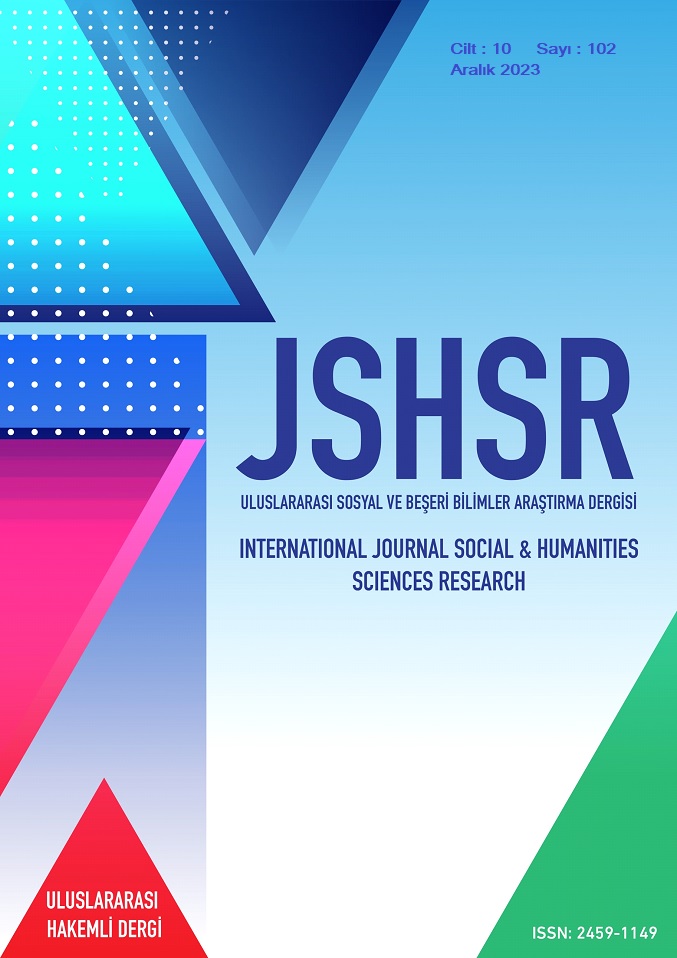The Role of Logistics Sector in Regional Development: The Case of Siirt
DOI:
https://doi.org/10.5281/zenodo.10452162Keywords:
Regional Development, Siirt, Logistics SectorAbstract
The logistics concept, which has been examined in many academic rentals in Turkey, has been used for the first time.
Literature also emerged in the early 20th century. Although it is new to use the concepts of logistics, it has heavily affected the competitiveness of the performances of the enterprises. The movements experienced in regional development fields on a global basis cause remarkable developments in the goals, practices and thinking of these field policies. In Turkey, on the other hand, the interregional development gap is quite high. At this point, new generation theories are very valuable in terms of internal and academic studies on regional development, which are constantly updated and guide new policy decisions. The logistics sector, whose initial aim is to progress rapidly, together with the ones that manage the regional development in Turkey, are the areas where this business is especially selected and concentrated.
This delivery, the definition of the logistics concept, the responsibility for sales and general management of logistics services are carried out. In the research part of the study, the developments in the logistics sector in the province of Siirt, the logistics structure of the province and the public support in this regard are discussed. On the other hand, as a data collection method, face-to-face survey operators regarding exports in the logistics sector and these sales in Siirt province were used.
References
Acar, A.Z. (2021). Stratejik Lojistik Yönetimi: Rekabet Avantajı Kazanmak İçin Lojistik Fonksiyonunun Stratejik Yönetimi, Nobel Akademik Yayıncılık.
Adıgüzel, G. (2011). Lojistiğin Dış Ticaret Üzerine Etkileri Ve Türkiye Örneği, (Yüksek Lisans Tezi), İstanbul Üniversitesi, Sosyal Bilimler Enstitüsü, İktisat Anabilim Dalı, İktisat Politikası Bilim Dalı
Alkan, A. (2017). Siirt İlinin Nüfus Gelişimi, Yapısı ve Dağılışı, Doğu Coğrafya Dergisi, 22(37), 53-82
Amin, A. (1999). An Institutionalist Perspective on Regional Economic Development. International Journal of Urban and Regional Research, 23: 365–378.
Arslan-Elmas, G. (2004). Cumhuriyetin İlanından Günümüze Türkiye’de Bölgesel Politikalar. Ekonomik Yaklaşım Dergisi, 15(50), 115 – 134.
Asheim, B. T. (1985).Capital accumulation, technological development and the spatial division of labor: a frameworkforanalysis, Norwegian Journal of Geography, 45, 87-97
Babacan, M. (2003). Lojistik Sektörünün Ülkemizdeki Gelişimi ve Rekabet Vizyonu, ge Academic Review, 3(1), 8-15.
Biggiero, L. and Sammarra, A. (2001). Identity and Identification in Industrial Districts. Journal of Management and Governance, 5, 61–82.
Büyükbaş, Ö. ve Ünlü, A. (2011). “Türkiye 'de Lojistik Sektörünün Görünümü ve Geleceği”, KSÜ Sosyal Bilimler Dergisi, 8(2), 101-117
DİKA (2018a). Dicle Kalkınma Ajansı 11. Kalkınma Planı Siirt İli Yerel Paydaş Toplantıları Sonuç Raporu, https://www.dika.org.tr/assets/upload/dosyalar/--11-kalkinma-plani-siirt-ili-yerel-paydas-toplantilari-sonuc-raporu.pdf
DİKA (2018b). Dicle Kalkınma Ajansı Özel Sektöre Yönelik Siirt Yatırım Destek ve Teşvik Rehberi, https://www.dika.org.tr/assets/upload/dosyalar/siirt-yatirim-destek-ve- tesvik-rehberi-.pdf
Emirkadı, Ö. ve Balcı, H. (2018). Lojistik Sektörü ve Türkiye Dış Ticaretine Etkileri, Journal of Institute of Economic Development and Social Researches, 4(8), 123-132
Erkan, B. (2014). Türkiye’de lojistik sektörü ve rekabet gücü. Assam Uluslararası Hakemli Dergi, 1(1), 44-65.
Gümüş, Y. (2013). Lojistik Sektörünün Türk Ekonomisine Katkıları ve Bir Araştırma, Uluslararası İşletme ve Yönetim Dergisi, 1(3), 302-324.
Koçak, R.D. (2020). Lojistiğin Tarihsel Gelişimi: Askeri Gereksinimden İşletme Lojistiğine ve Tedarik Zinciri Yönetimine Evrilme Süreci, Journal of Yasar University, 15(58), 246-258
Morrison, A. (2000). Entrepreneurship: What triggers it? International Journal of Entrepreneurship Behavior and Research. 6 (2), 59–71.
Nijkamp, P., & Abreu, M. A. (2009). Regional development theory. Amsterdam, The Netherlands: Vrije Universiteit, Faculty of Economics and Business Administration.
Öner, Y. ve Tolun, B. (2019). Global Eğilimler Işığında Lojistik Sektörü, KPMG, https://home.kpmg/tr/tr/home/gorusler/2019/01/global-egilimler-isiginda-lojistik- sektoru.html
Scott, A. J. and Storper, M. (2003). Regions, globalization, development. Regional Studies 37(6/7), 579–593.
Sezal, L. (2019). “2023 Hedefleri Kapsamında Türkiye’de Lojistik Hizmetlerinin Gelişimi ve Türkoğlu Lojistik Merkezinin Kahramanmaraş Ticaretine Etkisi”, 2023 Hedefleri Doğrultusunda Uluslararası Ticaret ve Lojistik Konferansı, Nisan 2019, Kahramanmaraş
Sezgin, T. (2008). Lojistik Kavramı ve Türkiye’deki Uygulamaları, [Yayınlanmamış Doktora Tezi], Fen Bilimleri Enstitüsü, İstanbul Teknik Üniversitesi.
Topçuoğlu, Ö.; Bozkurt, E., Efeoğlu, R., Yazıcılar, F.G. (2016). Türkiye’de Lojistik Sektörünün Ekonomiye Katkısı: Bir Etkinlik Analizi, II. International Caucasus-Central Asia Foreign Trade and Logistics Congress Proceeding Book, 565-578,
Türk Dil Kurumu (2005). Türkçe Sözlük, (10. Baskı), Türk Dil Kurumu Yayınları.
UTİKAD-Uluslararası Taşımacılık ve Lojistik Hizmet Üretenleri Derneği, (2019). Lojistik Sektör Raporu. Radika Matbaası.
Wolff, R.A. ve Yıldız, D. (2018). Türkiye’de Lojistik Yönetimindeki Gelişmeler: Stratejik Bir Bakış Açısı. Social Sciences Research Journal, 7(3), 187-198
Yılmaz H., ve Elmas, A. (2018). Siirt ilinin nüfusu üzerine bir değerlendirme. Siirt Üniversitesi Sosyal Bilimler Enstitüsü Dergisi, 6(11), 123-136.
Downloads
Published
How to Cite
Issue
Section
License
Copyright (c) 2023 INTERNATIONAL JOURNAL OF SOCIAL HUMANITIES SCIENCES RESEARCH

This work is licensed under a Creative Commons Attribution 4.0 International License.


